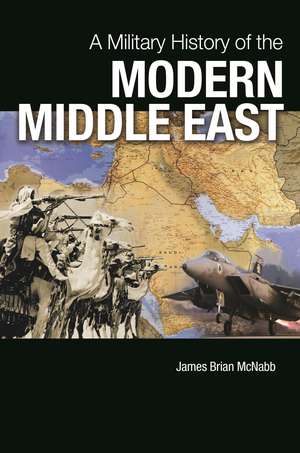A Military History of the Modern Middle East
Autor James Brian McNabben Limba Engleză Hardback – 8 mar 2017 – vârsta până la 17 ani
| Toate formatele și edițiile | Preț | Express |
|---|---|---|
| Paperback (1) | 197.27 lei 6-8 săpt. | |
| Bloomsbury Publishing – 29 noi 2023 | 197.27 lei 6-8 săpt. | |
| Hardback (1) | 373.26 lei 6-8 săpt. | |
| Bloomsbury Publishing – 8 mar 2017 | 373.26 lei 6-8 săpt. |
Preț: 373.26 lei
Preț vechi: 485.06 lei
-23% Nou
Puncte Express: 560
Preț estimativ în valută:
71.44€ • 73.62$ • 60.31£
71.44€ • 73.62$ • 60.31£
Carte tipărită la comandă
Livrare economică 03-17 martie
Preluare comenzi: 021 569.72.76
Specificații
ISBN-13: 9781440829635
ISBN-10: 1440829632
Pagini: 464
Dimensiuni: 156 x 235 mm
Greutate: 0.95 kg
Editura: Bloomsbury Publishing
Colecția Praeger
Locul publicării:New York, United States
ISBN-10: 1440829632
Pagini: 464
Dimensiuni: 156 x 235 mm
Greutate: 0.95 kg
Editura: Bloomsbury Publishing
Colecția Praeger
Locul publicării:New York, United States
Caracteristici
Presents the evolution of combat and military thought in the region from ancient times into the contemporary era, summarizing the impact of the ancient and medieval worlds on the modern Middle East
Notă biografică
James Brian McNabb, PhD, is adjunct professor with Troy University's Master of Science in International Relations (MSIR) program.
Cuprins
IntroductionChapter 1: Napoleon's Egyptian Campaign and the Decline of the Ottoman EmpireChapter 2: The First World War and the Ottoman SuccessionChapter 3: The Second World WarChapter 4: The Cold War and the Establishment of IsraelChapter 5: Arab-Israeli Conventional Operations, 1967-1973Chapter 6: British Military Withdrawal, the Iranian Revolution, and the Iran-Iraq WarChapter 7: The Establishment of USCENTCOM, Iraq's Invasion of Kuwait, and Operation Desert StormChapter 8: Containing Saddam, Jihad in Afghanistan, and Terrorist Attacks on the U.S. HomelandChapter 9: The Iraq War and the Rise of the Islamic State in the Middle EastChapter 10: SummaryNotesSelected BibliographyIndex
Recenzii
Packing concise history with solid analysis, it is an excellent reference for anyone who wants an overview of how war has and continues to shape this region of the world.
The author's in-depth research and use of primary sources result in a vivid narrative that covers military tactics and the state of the political arena within each time period discussed. An extensive bibliography and several maps lend context and provide resources for further research. Laden with quotes and excerpts from military documents, McNabb's chronological presentation of the content gives students an easy way to seek out material on a particular segment of Middle Eastern military history. VERDICT Best for academic libraries with extensive military history collections and graduate programs.
The book goes beyond mere historical narratives to provide an analytical context on various topics such as the impact of technology on the Middle East conflict, the role of politics, the rivalry of the Great Powers and its cold war, and the continued influence of religion and ethnic and tribal hatred on never-ending conflicts in the region.
McNabb covers the key religious and cultural dynamics that have driven events in the region for the last 220 years. In addition, he examines the commonalities and synergies between elite interests, factionalism, and the problem of development within the region as it relates to conflict and military decision making. Summing Up: Recommended. Upper-division undergraduates and above.
Overall, this is a superb book if one seeks to understand the history of military affairs in the Middle East, which ultimately has shaped the region's politics. The author does not spare any details regarding key operations and has an engaging writing style. McNabb has not only traced the rise and fall of the Ottoman Empire, the consequences and the events that followed, but he makes the reader understand how the history influenced the shape of Middle Eastern affairs in the modern era. In closing, A Military History of the Modern Middle East well deserves a place on the scholar-practitioner's bookshelf.
This book is an exceptionally detailed, comprehensive examination of military matters in the Middle East that will influence current and future strategists.
The author's in-depth research and use of primary sources result in a vivid narrative that covers military tactics and the state of the political arena within each time period discussed. An extensive bibliography and several maps lend context and provide resources for further research. Laden with quotes and excerpts from military documents, McNabb's chronological presentation of the content gives students an easy way to seek out material on a particular segment of Middle Eastern military history. VERDICT Best for academic libraries with extensive military history collections and graduate programs.
The book goes beyond mere historical narratives to provide an analytical context on various topics such as the impact of technology on the Middle East conflict, the role of politics, the rivalry of the Great Powers and its cold war, and the continued influence of religion and ethnic and tribal hatred on never-ending conflicts in the region.
McNabb covers the key religious and cultural dynamics that have driven events in the region for the last 220 years. In addition, he examines the commonalities and synergies between elite interests, factionalism, and the problem of development within the region as it relates to conflict and military decision making. Summing Up: Recommended. Upper-division undergraduates and above.
Overall, this is a superb book if one seeks to understand the history of military affairs in the Middle East, which ultimately has shaped the region's politics. The author does not spare any details regarding key operations and has an engaging writing style. McNabb has not only traced the rise and fall of the Ottoman Empire, the consequences and the events that followed, but he makes the reader understand how the history influenced the shape of Middle Eastern affairs in the modern era. In closing, A Military History of the Modern Middle East well deserves a place on the scholar-practitioner's bookshelf.
This book is an exceptionally detailed, comprehensive examination of military matters in the Middle East that will influence current and future strategists.
